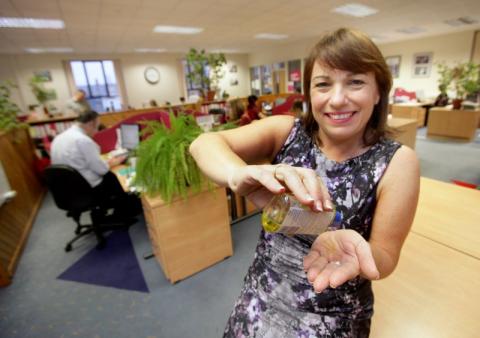Flu in the workplace – make it your business

It’s that time of year again; the time when you start hearing coughing and sneezing throughout the office and working days are lost due to winter viruses.
The Public Health Agency (PHA) is advising all employers of ways colds and flu can be reduced in the workplace, leading to less sick days and a more productive workforce.
There are many actions employers can take to prevent winter viruses at work, the first of which is making adequate arrangements to allow employees who are in the flu at-risk groups to get their flu vaccine and give a reasonable amount of flexibility to accommodate employees getting out of work to visit their GP. Although flu can be mild for many, people who are in at-risk groups are particularly susceptible to the seriousness of flu.
Dr Richard Smithson, Consultant in Health Protection, PHA, said: “Employers have a key role in protecting employees' health. Encouraging at-risk employees to get their flu vaccine is vital. Ensuring good hand hygiene and asking employees to stay at home when they are sick will help ensure that the workplace will remain healthy for everyone.”
Readily spread when people are indoors, winter viruses are often passed along from person to person and surface to surface in the workplace. Employers can help reduce the spread of all viruses by encouraging good personal hygiene:
- washing hands frequently with soap and water to reduce the spread of the virus from the hands to the face or to others;
- covering nose and mouth when coughing or sneezing and using a tissue when possible;
- disposing of used tissues quickly and carefully and washing hands immediately;
- cleaning hard surfaces (eg door handles) frequently using your usual cleaning product.
Dr Smithson added: “Adequate supplies of liquid soap, hot and cold water, and paper towels (or, in the absence of paper towels, hot air dryers) should be available. Hand sanitisers may be useful in some circumstances (eg when staff travel away from base) but good hand washing facilities, with soap and water, are preferable where they can be provided.”
Supporting the PHA, Tanya Kennedy, Workplace Director, Business in the Community, said: “Flu is highly infectious, particularly in confined workspaces, and can cost a business dearly in lost productivity. Up to 15% of a company's workforce can be absent with colds and flu over the winter months. Encouraging the at-risk groups to get the flu vaccination, represents an investment by responsible employers who not only benefit from sustained productivity and employee engagement, but also ensure that employees feel valued when they take a genuine interest in the health and wellbeing of them and their families.”
For more information on seasonal flu go to www.fluawareni.info and follow us on Facebook (www.facebook.com/publichealthagency) and Twitter (www.twitter.com/publichealthni)
Contact PHA Communications on (028) 9055 3663
For more information about the flu vaccine for 2012/13, visit www.fluawareni.info or speak to your GP/nurse or member of staff at the antenatal clinic in your local Health and Social Care Trust.
‘At risk’ groups for flu include:
Anyone aged 65 or over, even if they feel fit and healthy at the moment.
Pregnant women (at any stage of pregnancy).
Children and adults who have any of the following medical conditions:
- a chronic chest condition such as asthma;
- a chronic heart condition;
- chronic kidney disease;
- diabetes;
- lowered immunity due to disease or treatment such as steroids or cancer therapy;
- a chronic neurological condition such as stroke, multiple sclerosis or a condition that affects your nervous system, such as cerebral palsy;
- any other serious medical condition – check with your doctor if you are unsure.
- children who have previously been admitted to hospital with a chest infection.
- children attending schools for those with severe learning difficulties.
- anyone living in a residential or nursing home.
- main carers for elderly or disabled people.
